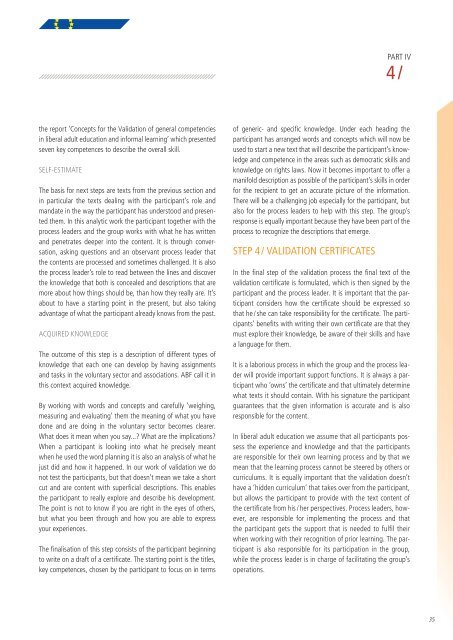RECOGNITION OF NON-FORMAL AND INFORMAL ... - Solidar
RECOGNITION OF NON-FORMAL AND INFORMAL ... - Solidar
RECOGNITION OF NON-FORMAL AND INFORMAL ... - Solidar
Create successful ePaper yourself
Turn your PDF publications into a flip-book with our unique Google optimized e-Paper software.
PART IV<br />
4 /<br />
the report ‘Concepts for the Validation of general competencies<br />
in liberal adult education and informal learning’ which presented<br />
seven key competences to describe the overall skill.<br />
SELF-ESTIMATE<br />
The basis for next steps are texts from the previous section and<br />
in particular the texts dealing with the participant’s role and<br />
mandate in the way the participant has understood and presented<br />
them. In this analytic work the participant together with the<br />
process leaders and the group works with what he has written<br />
and penetrates deeper into the content. It is through conversation,<br />
asking questions and an observant process leader that<br />
the contents are processed and sometimes challenged. It is also<br />
the process leader’s role to read between the lines and discover<br />
the knowledge that both is concealed and descriptions that are<br />
more about how things should be, than how they really are. It’s<br />
about to have a starting point in the present, but also taking<br />
advantage of what the participant already knows from the past.<br />
ACQUIRED KNOWLEDGE<br />
The outcome of this step is a description of different types of<br />
knowledge that each one can develop by having assignments<br />
and tasks in the voluntary sector and associations. ABF call it in<br />
this context acquired knowledge.<br />
By working with words and concepts and carefully ‘weighing,<br />
measuring and evaluating’ them the meaning of what you have<br />
done and are doing in the voluntary sector becomes clearer.<br />
What does it mean when you say...? What are the implications?<br />
When a participant is looking into what he precisely meant<br />
when he used the word planning it is also an analysis of what he<br />
just did and how it happened. In our work of validation we do<br />
not test the participants, but that doesn’t mean we take a short<br />
cut and are content with superfi cial descriptions. This enables<br />
the participant to really explore and describe his development.<br />
The point is not to know if you are right in the eyes of others,<br />
but what you been through and how you are able to express<br />
your experiences.<br />
The fi nalisation of this step consists of the participant beginning<br />
to write on a draft of a certifi cate. The starting point is the titles,<br />
key competences, chosen by the participant to focus on in terms<br />
of generic- and specifi c knowledge. Under each heading the<br />
participant has arranged words and concepts which will now be<br />
used to start a new text that will describe the participant’s knowledge<br />
and competence in the areas such as democratic skills and<br />
knowledge on rights laws. Now it becomes important to offer a<br />
manifold description as possible of the participant’s skills in order<br />
for the recipient to get an accurate picture of the information.<br />
There will be a challenging job especially for the participant, but<br />
also for the process leaders to help with this step. The group’s<br />
response is equally important because they have been part of the<br />
process to recognize the descriptions that emerge.<br />
STEP 4 / VALIDATION CERTIFICATES<br />
In the fi nal step of the validation process the fi nal text of the<br />
validation certifi cate is formulated, which is then signed by the<br />
participant and the process leader. It is important that the participant<br />
considers how the certifi cate should be expressed so<br />
that he / she can take responsibility for the certifi cate. The participants’<br />
benefi ts with writing their own certifi cate are that they<br />
must explore their knowledge, be aware of their skills and have<br />
a language for them.<br />
It is a laborious process in which the group and the process leader<br />
will provide important support functions. It is always a participant<br />
who ‘owns’ the certifi cate and that ultimately determine<br />
what texts it should contain. With his signature the participant<br />
guarantees that the given information is accurate and is also<br />
responsible for the content.<br />
In liberal adult education we assume that all participants possess<br />
the experience and knowledge and that the participants<br />
are responsible for their own learning process and by that we<br />
mean that the learning process cannot be steered by others or<br />
curriculums. It is equally important that the validation doesn’t<br />
have a ‘hidden curriculum’ that takes over from the participant,<br />
but allows the participant to provide with the text content of<br />
the certifi cate from his / her perspectives. Process leaders, however,<br />
are responsible for implementing the process and that<br />
the participant gets the support that is needed to fulfi l their<br />
when working with their recognition of prior learning. The participant<br />
is also responsible for its participation in the group,<br />
while the process leader is in charge of facilitating the group’s<br />
operations.<br />
35
















